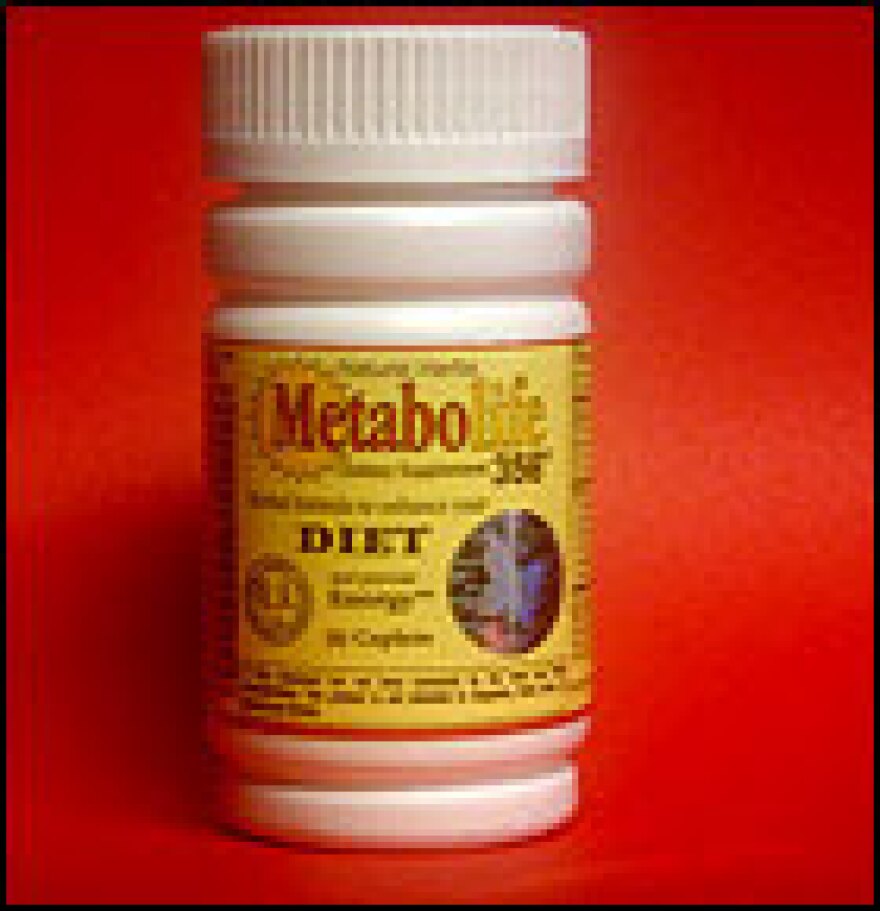
For years, Metabolife denied it had received any reports of health problems linked to its popular weight-loss aid, Metabolife 356. But recently, under pressure from the government, the herbal supplement company turned over 15,000 consumer complaints to the Food and Drug Administration. The reports listed a range of side effects, from insomnia to death.
And earlier this week, a federal judge ordered Metabolife to pay $4.1 million to four people who suffered strokes or heart attacks after taking the company's weight loss product. The case marks the first time a suit against Metabolife has gone to trial, and the company faces dozens of other cases.
Metabolife contains ephedra, an herbal supplement that's been linked to almost 100 deaths. Despite its possibly deadly side effects, the diet aid has racked up $1 billion in sales and remains a popular supplement for those looking for an energy boost or trying to lose weight.
NPR's Snigdha Prakash reports on the winning formula behind ephedra: insatiable consumer appetite, lack of government regulation and entrepreneurial zeal.
The Chinese have used ephedra for thousands of years, to clear stuffy noses and help asthmatics breathe more easily. But, as Prakash reports, 21st century Americans use it as a pick-me up.
For an extra kick, ephedra supplements are often mixed with caffeine and sold in the form of pills. Washington, D.C., Police Lt. Michael Smith takes ephedra supplements in the form of a drink called Ripped Fuel, sold at his gym. He uses ephedra to get him through his long workouts.
"I do feel like I have a lot more energy," he tells Prakash. "I can work out a lot longer. I’m naturally a fat person. I mean, I’m like really a fat person. If I don’t work out, I gain weight."
Dr. Christine Haller, assistant professor of medicine at the University of California at San Francisco, says the ephedrine (which is derived from ephedra) found in Ripped Fuel is chemically similar to metamphetamines or speed.
"It cause you to be more alert, less tired, less lethargic, less fatigued," she says.
Ephedra manufacturers sell more than $2 billion of ephedra a year, to people who want to control their weight and feel more energetic. Others say they take it for depression or as a party drug.
Millions of Americans take ephedra without problems or with relatively minor ones such as jitteriness and insomnia.
But judging from the stories of thousands of consumers who have complained about ephedra to the Food and Drug Administration, many others have seen more disturbing effects, says Prakash.
Dr. Haller analyzed some of the complaints for an article in the New England Journal of Medicine:
"High blood pressure was the most common reaction. There were 10 strokes. There were a number of deaths, including sudden cardiac death when a person is apparently healthy and doing fine, and then suddenly collapses and has no measurable blood pressure or heart activity."
There is mounting pressure for the FDA to ban ephedra because of these reactions.
The FDA has already banned the mix of synthetically made ephedrine and caffeine, but because Metabolife and other dietary supplements contain ephedrin derived from the herb ephedra, taking the ephedra supplements off the market is much tougher.
Under a 1994 law, the FDA must prove that problems associated with ephedra supplements are caused by them. The FDA itself generally doesn't conduct clinical studies, and no one else is offering to do the studies, or pay for them.
Almost 2,000 of the complaints Metabolife released this summer involve serious adverse reactions, including 20 heart attacks, 24 strokes, 40 seizures and four deaths, according to Sen. Richard Durbin (D-IL), who held a hearing on the complaints earlier this month.
“Metabolife records indicate that many of the significant adverse events involve consumers who were young, in good health and taking recommended dosages,” Durbin said at the hearing.
Metabolife maintains there is no demonstrable connection between use of Metabolife 356 and any of the conditions reported by the consumers calling its help line.
Durbin wants ephedra banned right away. The Department of Health and Human Services has commissioned a review of the scientific literature on ephedra.
Copyright 2022 NPR. To see more, visit https://www.npr.org.


